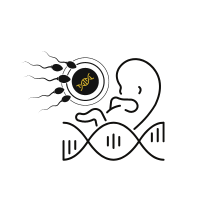- Medical History: A comprehensive overview of the woman’s reproductive health, including menstrual history, contraceptive history, and any previous pregnancies.
- Menstrual Cycle Assessment: Tracking the menstrual cycle to identify irregularities in cycle length, ovulation, and potential hormonal imbalances. Ovulation Tracking via ultrasound monitoring to assess the regularity of ovulation.
- Hormonal Tests: Measurement of hormone levels, including follicle-stimulating hormone (FSH), luteinizing hormone (LH), estradiol, progesterone hormones. This is not needed routinely but only in selected cases.
- Ovarian Reserve Testing: Assessment of the quantity and quality of a woman’s remaining eggs. This may include tests like anti-Müllerian hormone (AMH) and antral follicle count (AFC).
- Tubal Patency Testing:Tubal factor infertility (blocked or damaged Fallopian tubes) are seen in 25-30% of Female Infertility cases. There are different methods of testing for patency:
- Hysterosalpingography (HSG): This is an X-ray procedure to evaluate the patency of the fallopian tubes and identify any abnormalities in the uterine cavity. It involves inserting a cannula inside the uterus via the cervix and passing a radio-opaque dye into the uterus. As the dye passes through the tubes and spills out of the openings, a series of x-rays are shot to visualize this. It can help identify tubal blockage and abnormalities in uterine shape and anatomy. It is the oldest method; it is a painful method and has the risk of radiation exposure.
- Sonohysterography / Hysterosalpingography: This is an ultrasound procedure, like HSG, but much safer and less painful. A saline solution is passed inside the uterus under ultrasound guidance. It not only helps assess the tubes but also helps assess the uterine cavity for abnormalities such as polyps, fibroids, or adhesions.
- Pelvic Ultrasound: Ultrasound Imaging of the pelvic organs, including the uterus and ovaries, to check for structural abnormalities or ovarian cysts.
- Thyroid Function Tests: Assessment of thyroid hormones to rule out thyroid dysfunction, which can affect fertility.
- Blood Glucose and Glycosylated Hemoglobin: Screening for conditions like polycystic ovary syndrome (PCOS) and/or diabetes that may impact fertility.
- Infectious Disease Testing: Screening for sexually transmitted infections (STIs) that can affect reproductive health.
Couples should consider fertility evaluation if they have been actively trying to conceive for a year without success, or sooner if there are known fertility issues or concerns.
Yes, it’s recommended for both partners to undergo fertility testing. Infertility can result from factors affecting either the male or female partner, or both.
Male fertility evaluation typically includes a semen analysis, hormonal tests, scrotal ultrasound, and sometimes genetic testing or specialized sperm function tests.
Female fertility evaluation may include hormonal tests, menstrual cycle tracking, ovulation assessment, imaging studies (ultrasound, HSG), and sometimes laparoscopy or genetic testing.
The duration varies, Basic fertility testing that involves bloodwork and a scan can be done in 2 days. The advanced test will take a longer time 1-2 weeks to complete the necessary tests and assessments for both partners. If you have been advised to undergo Genetic testing or ERA, the reports may take anywhere from 3 weeks to 45 days, depending on the type of test.
Yes, factors like diet, exercise, smoking, alcohol consumption, and stress can impact fertility for both men and women.
Fertility declines with age, particularly for women. It’s generally recommended to seek fertility evaluation sooner if the woman is over 35 years old.




